Key takeaways:
- Online privacy is essential to protect personal information and foster freedom of expression, highlighting the impact of data breaches and surveillance.
- Secure mining platforms emphasize strong security features such as two-factor authentication, transparency in operations, and encryption technology to safeguard user information.
- Regular privacy audits, using strong passwords with a password manager, and being cautious with shared information on social media are crucial for maintaining online privacy.
- Safe mining operations require keeping software updated, using secure wallets for cryptocurrencies, and carefully selecting mining pools based on their security practices.
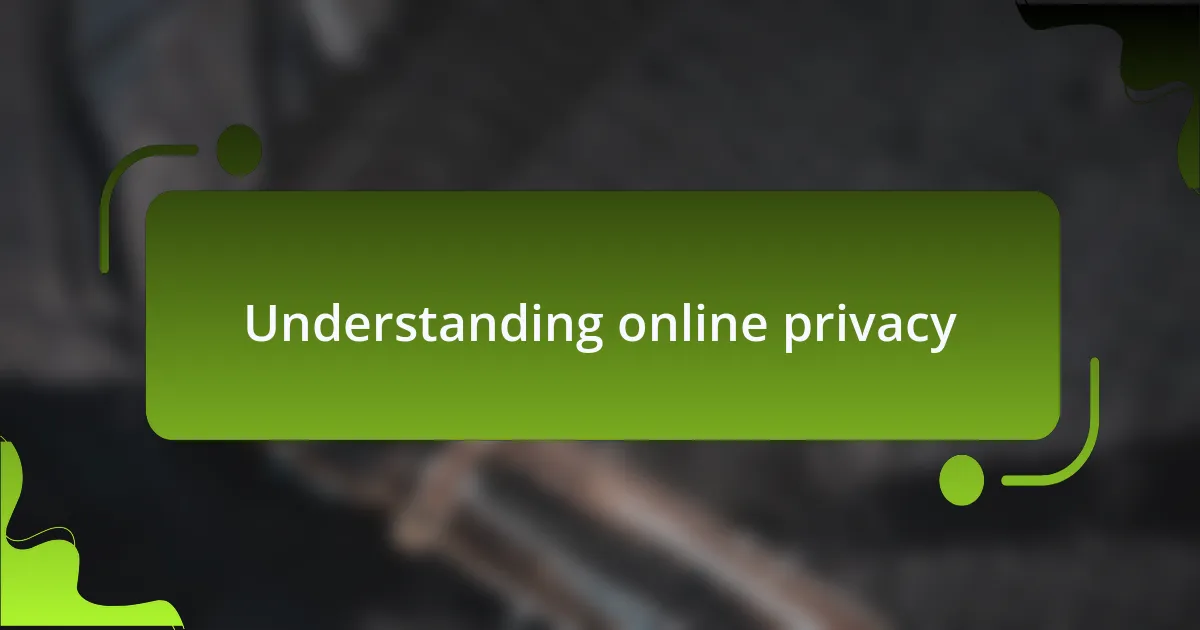
Understanding online privacy
Online privacy can feel abstract, but it’s deeply personal and impacts our daily lives. I recall a time when I casually shared a post on social media, only to realize later that my privacy settings were far too lax. How often do we stop to consider who might be watching our digital moves?
When I first began understanding online privacy, I felt overwhelmed by all the information. Terms like “encryption” and “two-factor authentication” seemed daunting. Yet, as I learned their significance, I found my confidence growing. Isn’t it reassuring to know that taking these steps can enhance our security online?
Navigating online privacy isn’t just about protecting data; it’s about safeguarding our identities. I remember browsing a website and realizing how many trackers were lurking in the background. It made me wonder: How much of our online experience is influenced by unseen entities? Understanding these aspects can empower us to take control of our own digital narratives.
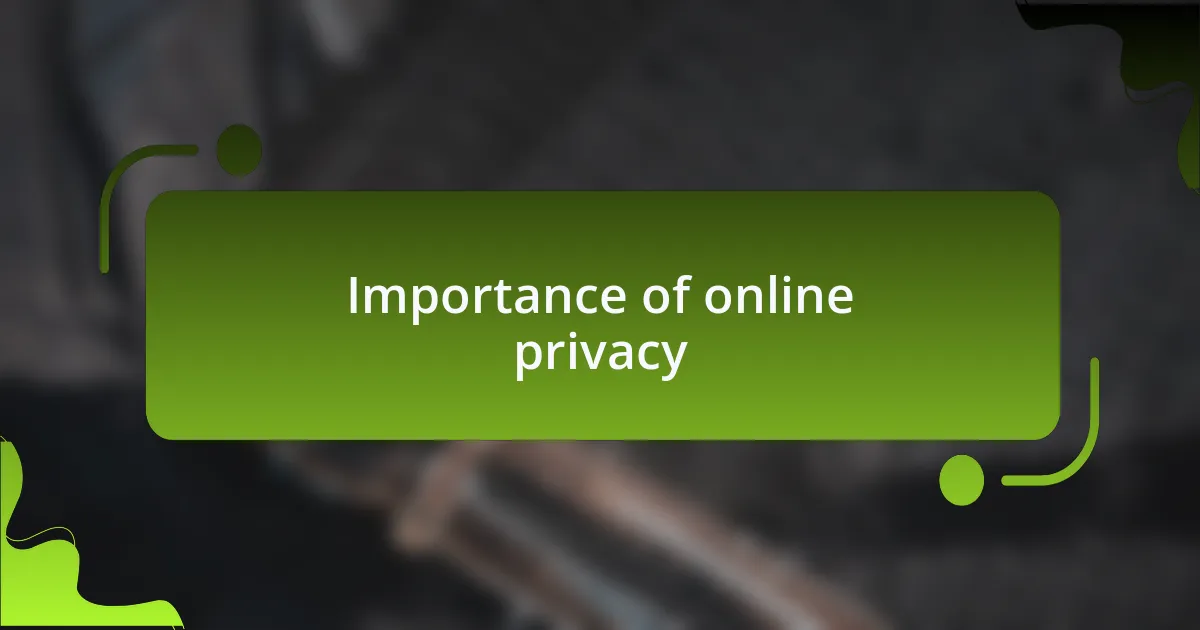
Importance of online privacy
Privacy online is crucial because it protects our personal information from unauthorized access. I remember a friend who had her identity stolen after a data breach; it not only drained her finances but caused immense stress that lingered for months. Isn’t it astonishing how quickly our digital lives can be upended by a single oversight?
The reality is that maintaining online privacy is now more than just a choice; it’s a necessity. I often wonder how many times we casually hand over our data in exchange for convenience, not fully grasping the potential risks involved. This exchange can lead to targeted ads and manipulative practices, even shaping our opinions without us realizing it.
Moreover, online privacy allows us to express ourselves freely, without fear of censorship or judgment. During my own online activism, I faced situations where the threat of backlash made me reconsider sharing personal views. When our expressions are stifled by the fear of surveillance, how can we genuinely communicate in a connected world? Keeping our online spaces private fosters open dialogue and a sense of safety.
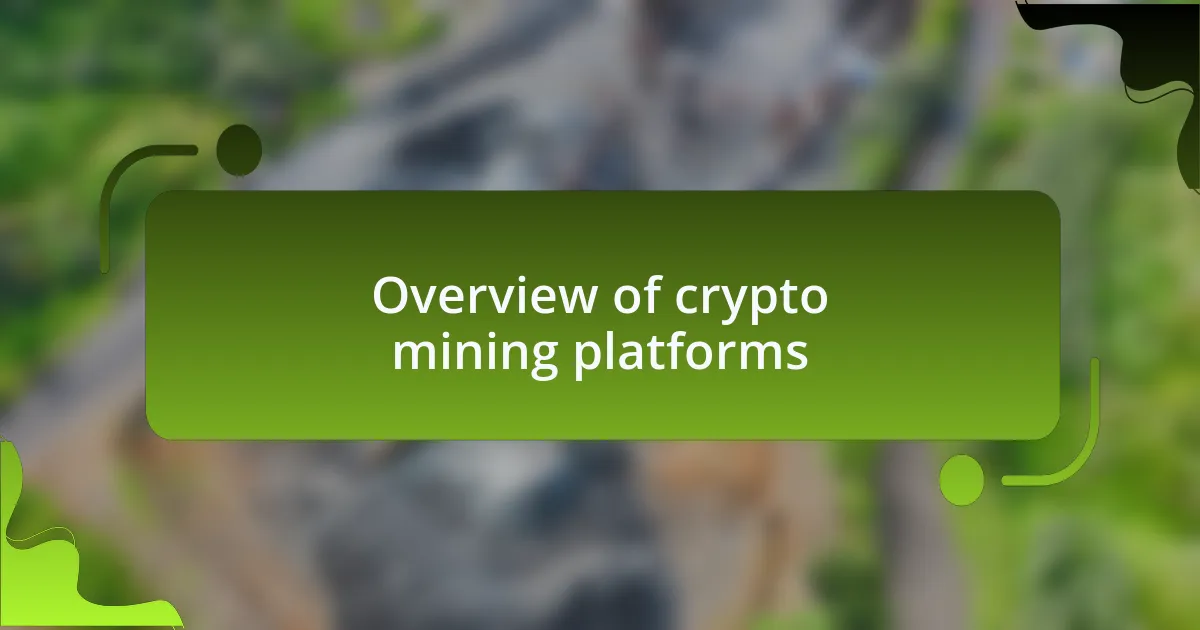
Overview of crypto mining platforms
Crypto mining platforms have emerged as vital players in the decentralized financial ecosystem. These platforms facilitate the process of validating transactions on a blockchain, and it’s fascinating how they turn computational power into rewards, often in the form of cryptocurrency. When I first delved into crypto mining, I was astounded by the complexities involved—like choosing the right hardware and software—each decision impacting potential profitability.
Not every crypto mining platform operates the same way; some provide cloud mining services while others require users to set up their rigs at home. The choices can feel overwhelming. I remember setting up my first mining rig and feeling a mix of excitement and frustration, as I navigated through various settings to optimize my setup. Which platform would provide the best rates or the most user-friendly interface? That initial confusion is something many newcomers share.
Additionally, many platforms emphasize community and support, creating forums where miners can exchange tips and troubleshoot issues. This camaraderie is crucial, especially for those just starting their journey. Reflecting on my early days, the advice from experienced miners helped me tremendously, turning a solitary venture into a shared mission. Isn’t it remarkable how technology fosters such connections, even in a largely digital environment?
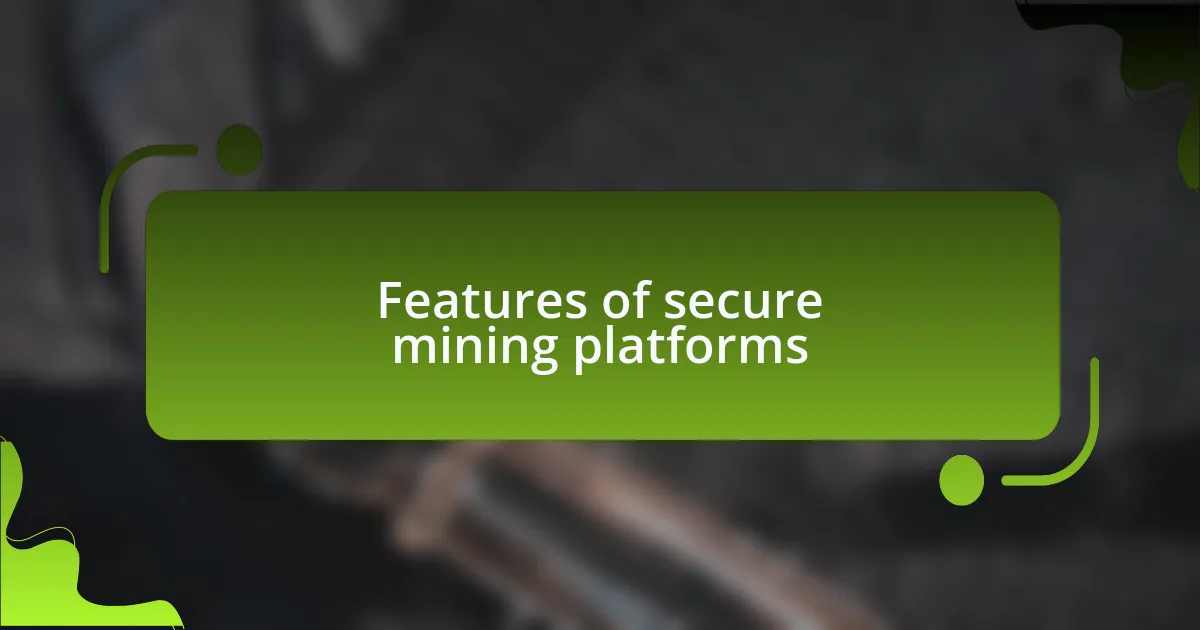
Features of secure mining platforms
Secure mining platforms often feature robust security protocols that protect users from potential threats. I’ve seen firsthand the importance of two-factor authentication; it adds an essential layer of protection. It’s reassuring to know that even if my password is compromised, my account remains secure.
Another characteristic I value in secure platforms is transparency in operations. I once encountered a mining service that openly shared its fee structure and payout methods. This level of honesty built trust and made me feel confident in my investments. Have you ever considered how transparency affects your perception of a platform? For me, it’s a game changer.
Furthermore, the use of encryption technology is crucial for secure mining. When I learned about end-to-end encryption, it transformed my understanding of data protection. I realized that this feature not only safeguards my personal information but also enhances the integrity of transactions. Understanding these layers of security can significantly impact our overall experience in the mining world.
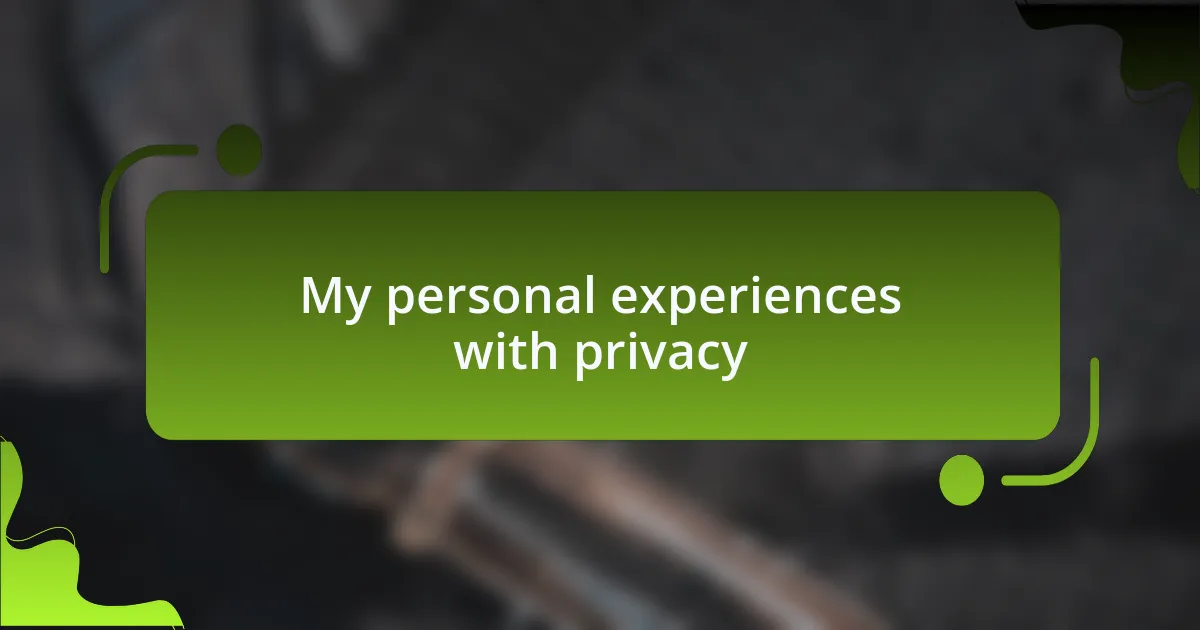
My personal experiences with privacy
When I first started navigating online privacy, I was overwhelmed by the options available. I remember stumbling upon a mining platform that promised anonymity through a VPN service. I felt a wave of relief, believing my online activities were shielded. However, I quickly learned that not all VPNs are created equal. Have you ever felt secure only to realize there were gaps in your protection? That experience made me more cautious about my choices in online privacy.
I’ve had moments where I shared sensitive data without understanding the risks. I once used a mining platform that didn’t clearly outline its privacy policies. It left me feeling vulnerable and anxious about what could happen to my information. The realization that my personal data was potentially exposed forced me to prioritize platforms that are transparent about their privacy measures. I strongly believe that clear communication about privacy practices should be a non-negotiable feature for any service we trust.
I’ve also found value in regular privacy audits of my accounts and tools. One particular incident taught me the importance of this practice. After a minor data breach at a service I used, I became keenly aware of how often I needed to update my passwords and review my security settings. This experience reinforced my belief that maintaining privacy is an ongoing responsibility, not a one-time effort. How often do you evaluate your own online privacy measures? Taking the time to reflect on this can make all the difference in staying secure.
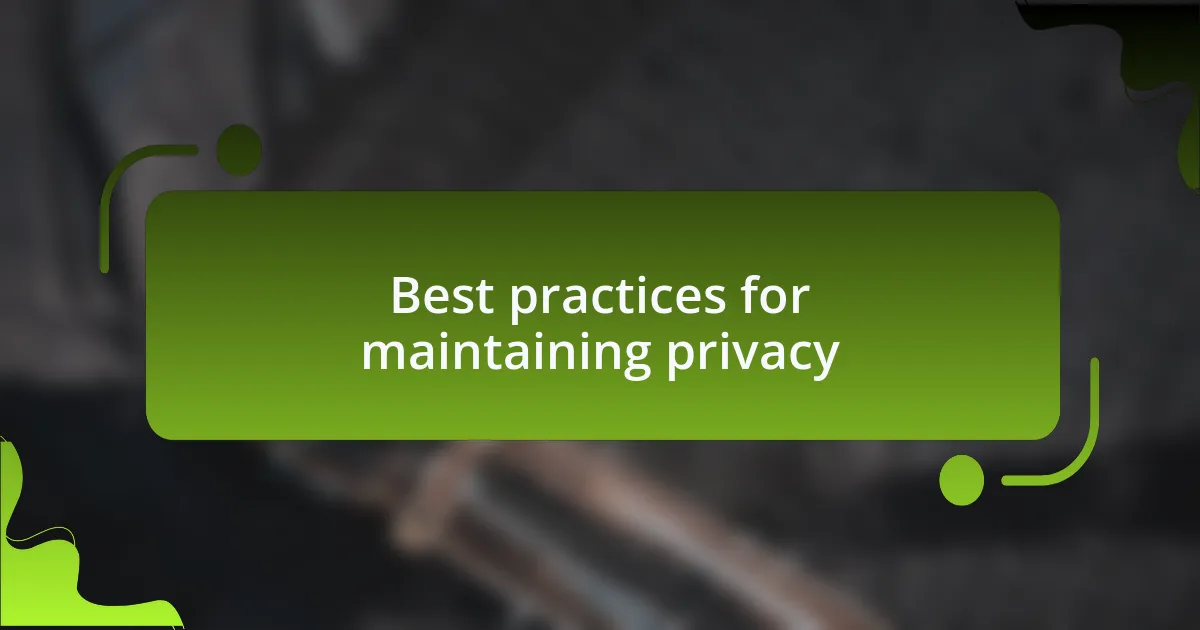
Best practices for maintaining privacy
When it comes to maintaining online privacy, I’ve found that using strong, unique passwords is essential. I still remember the anxiety of realizing that one of my passwords had been compromised. It was a wake-up call for me to adopt a password manager, which not only generates complex passwords but also stores them securely. Have you ever considered how many different accounts you manage? A good password manager can ease that mental load while keeping your data safe.
Another practice that significantly boosted my privacy is enabling two-factor authentication (2FA) wherever possible. I recall the relief I felt after setting it up on my email account. It adds that extra layer of protection, making it much harder for unauthorized users to gain access. Have you thought about how much your online presence might be at risk without 2FA? It’s a simple step that can save you from potential headaches down the line.
Lastly, being mindful of the information I share on social media has truly changed the game for me. I used to post without a second thought, but after seeing how companies tracked data through our public profiles, I became more selective. Have you ever stopped to think about the kind of information you’re putting out there? I’ve made a conscious effort to limit what I share, which not only protects me but also encourages me to engage with my online presence more thoughtfully.
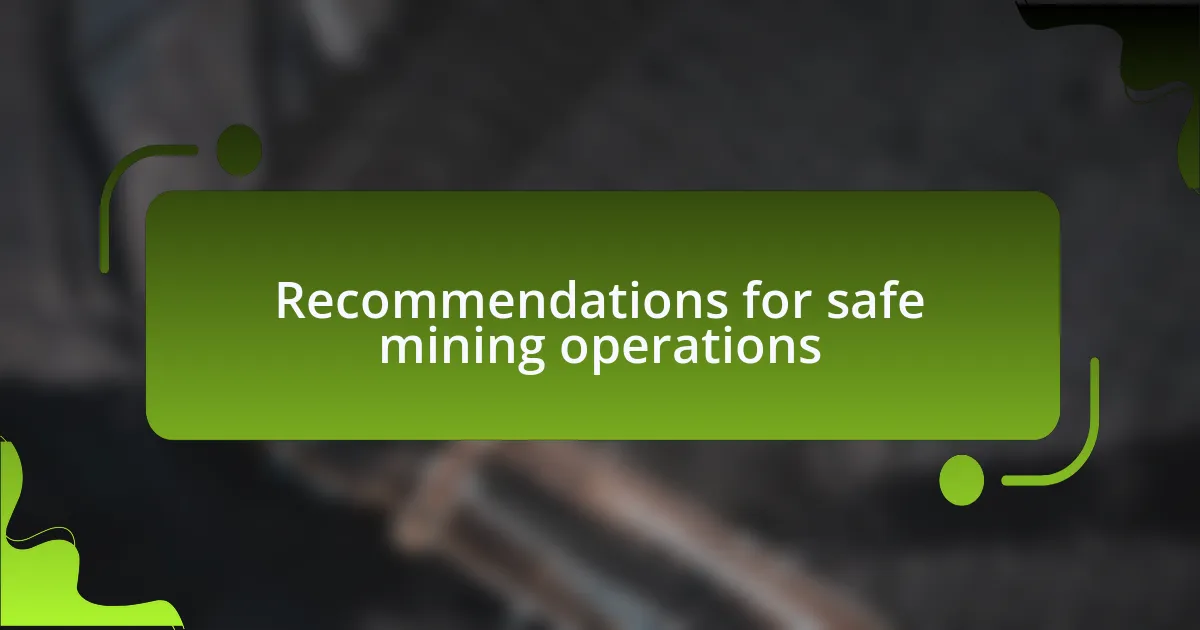
Recommendations for safe mining operations
One of the most crucial recommendations for safe mining operations is ensuring that your software is up-to-date. I still remember the time my mining rig was compromised because I neglected a software update. It felt like a huge setback, not just financially but also in terms of trust. Have you ever experienced that sinking feeling when you realize your security measures were outdated? Keeping software current is a simple yet powerful way to protect your assets.
Another essential step is to use a dedicated, secure wallet for storing your mined cryptocurrencies. I learned this the hard way when I kept my assets on an exchange and woke up to find them gone overnight due to a security breach. It was gut-wrenching! Have you taken the time to set up a hardware wallet? The peace of mind that comes from having full control over your holdings is invaluable.
Lastly, one practice I cannot stress enough is the importance of exploring different mining pools before committing. After switching pools based on my experiences, I found that some prioritize the security and privacy of their miners far better than others. Have you looked into the transparency and security practices of your current pool? It’s worth the effort to ensure you’re not just working harder but also working smart and safe.